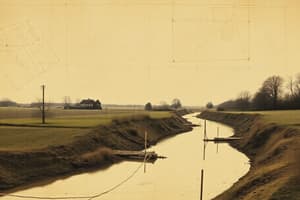Podcast
Questions and Answers
What is the approximate length of Nico Ditch?
What is the approximate length of Nico Ditch?
- 1 kilometer
- 15 kilometers
- 9.7 kilometers (correct)
- 20 kilometers
In which English region is Nico Ditch located?
In which English region is Nico Ditch located?
- Cornwall
- Kent
- Yorkshire
- Greater Manchester (correct)
Nico Ditch may have served as a defensive fortification or what else?
Nico Ditch may have served as a defensive fortification or what else?
- Boundary marker (correct)
- Drainage system
- Irrigation canal
- Transportation route
In what century was Nico Ditch likely completed?
In what century was Nico Ditch likely completed?
What is the meaning of 'magnum fossatum'?
What is the meaning of 'magnum fossatum'?
What is the possible meaning of the Anglo-Saxon word 'micel'?
What is the possible meaning of the Anglo-Saxon word 'micel'?
Through which of these locations does Nico Ditch pass?
Through which of these locations does Nico Ditch pass?
What is the possible origin of the name 'Nico'?
What is the possible origin of the name 'Nico'?
Which of these kingdoms may have used Nico Ditch as a boundary marker?
Which of these kingdoms may have used Nico Ditch as a boundary marker?
What is a characteristic of the ditch's profile?
What is a characteristic of the ditch's profile?
Where is a well-preserved section of Nico Ditch located?
Where is a well-preserved section of Nico Ditch located?
What is the width of parts of Nico Ditch that have survived?
What is the width of parts of Nico Ditch that have survived?
What is the earliest documented reference to Nico Ditch?
What is the earliest documented reference to Nico Ditch?
What is the grid reference for Ashton Moss, which is the start of Nico Ditch?
What is the grid reference for Ashton Moss, which is the start of Nico Ditch?
What is the grid reference for Hough Moss, which is the end of Nico Ditch?
What is the grid reference for Hough Moss, which is the end of Nico Ditch?
What is the grid reference for Urmston, which is where the Ditch may have extended to?
What is the grid reference for Urmston, which is where the Ditch may have extended to?
What was the conclusion of the University of Manchester Archaeological Unit?
What was the conclusion of the University of Manchester Archaeological Unit?
In which park is a 150-yard segment of the ditch protected as a Scheduled Ancient Monument?
In which park is a 150-yard segment of the ditch protected as a Scheduled Ancient Monument?
What was dismissed by historians as a 'popular fancy'?
What was dismissed by historians as a 'popular fancy'?
Flashcards
Nico Ditch
Nico Ditch
A 6-mile-long earthwork in Greater Manchester, thought to be a defensive fortification or boundary.
Hnickar
Hnickar
An Anglo-Saxon water spirit believed to seize and drown unwary travelers.
Nico Ditch's course
Nico Ditch's course
Marks the boundaries between several boroughs of present-day Greater Manchester.
Defensive fortification
Defensive fortification
Signup and view all the flashcards
Kingdom boundary marker
Kingdom boundary marker
Signup and view all the flashcards
Single-night construction
Single-night construction
Signup and view all the flashcards
"Gore Town" and "Red-Ditch"
"Gore Town" and "Red-Ditch"
Signup and view all the flashcards
Territorial boundary
Territorial boundary
Signup and view all the flashcards
Ditch Dimensions
Ditch Dimensions
Signup and view all the flashcards
Denton Golf Course
Denton Golf Course
Signup and view all the flashcards
Protected Segment
Protected Segment
Signup and view all the flashcards
Study Notes
- Nico Ditch is a 6-mile (9.7 km) linear earthwork in Greater Manchester, England.
- It stretches between Ashton-under-Lyne and Stretford.
- The ditch was constructed between the 5th and 11th centuries.
- The purpose of the ditch was either as a defensive fortification or a boundary marker.
- Surviving sections of the ditch are 4–5 yards (3.7–4.6 m) wide and up to 5 feet (1.5 m) deep.
- A section of the earthwork is protected as a Scheduled Ancient Monument.
Etymology
- The earliest reference to the ditch is in a charter from 1190–1212.
- In the charter, the ditch is referred to as "Mykelldiche" and magnum fossatum, Latin for "large ditch".
- The name Nico became established in the 19th and 20th century.
- Nico may be derived from the Anglo-Saxon Hnickar, a water spirit.
- The modern name is most likely a corruption of Mykelldiche, where micel means "big".
- An alternative derivation of Nico comes from nǽcan, an Anglo-Saxon verb meaning "kill".
Course
- Nico Ditch stretches from Ashton Moss in Ashton-under-Lyne to Hough Moss, east of Stretford.
- It passes through Denton, Reddish, Gorton, Levenshulme, Burnage, Rusholme, Platt Fields Park, Withington, and Chorlton-cum-Hardy
- The ditch crosses four metropolitan boroughs of present-day Greater Manchester.
- It coincides with the boundaries between Stockport and Manchester, and Tameside and Manchester.
- It reaches the Denton golf course.
- A section is now beneath the Audenshaw Reservoirs.
- The ditch may have extended west beyond Stretford to Urmston.
History
- The earthwork was constructed between the 5th century and the Norman conquest in 1066.
- Its original purpose may have been a defensive fortification or an administrative boundary.
- It may have marked a 7th-century boundary for the expansionist Anglo-Saxons.
- It could have been a late 8th or early 9th century boundary marker between Mercia and Northumbria.
- In the early medieval period, Northumbria, Mercia, and Wessex struggled for control over North West England.
- The ditch has been used as a boundary since at least the Middle Ages.
- Legend says the ditch was completed in one night by the inhabitants of Manchester to protect against Viking invaders in 869–870.
- Each man had to dig his section and build a bank equal to his height.
- 19th century folklore says the ditch was the site of a battle between Saxons and Danes.
- The towns of Gorton and Reddish were said to derive their names from this battle, but this idea is not considered accurate.
- Historians say Gorton means "dirty farmstead" and Reddish means "reedy ditch".
- Antiquarians and historians have been interested in the ditch since the 19th century.
- Between 1990 and 1997, the University of Manchester Archaeological Unit excavated sections of the ditch to determine its age and purpose.
- The investigations revealed that the bank to the north of the ditch is of 20th century origin.
- The ditch's profile is U-shaped, suggesting it was a territorial boundary marker.
- The conclusion of the project was that the ditch was probably a boundary marker.
Preservation
- The ditch is still visible in short sections.
- Sections are up to 4–5 yards (3.7–4.6 m) wide and up to 5 feet (1.5 m) deep.
- A 330-yard (300 m) stretch through Denton Golf Course and a section in Platt Fields Park are the best-preserved remains.
- A 150-yard (140 m) segment of the ditch in Platt Fields was protected as a Scheduled Ancient Monument in 1997.
- The rest of the ditch remains unprotected.
Studying That Suits You
Use AI to generate personalized quizzes and flashcards to suit your learning preferences.




